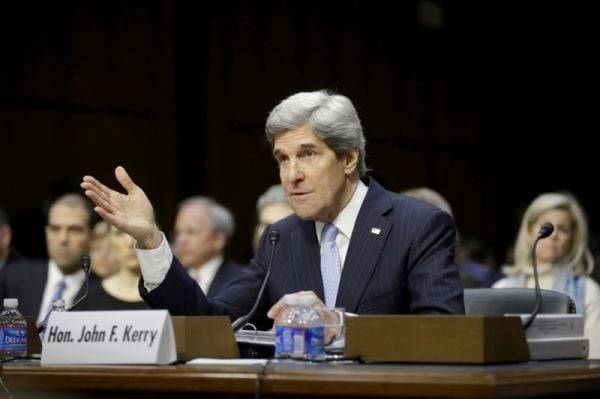
John Kerry speaks at a confirmation hearing on January 23. Source: AP
On January 24, during his confirmation hearing to become secretary of state, Senator John Kerry discussed the relationship between U.S. foreign policy and the U.S. economy. In well-phrased remarks that I expect will be quoted for some time to come, he noted:
…as a recovering member of the Super-Committee, I am especially cognizant of the fact that we can’t be strong in the world unless we are strong at home – and the first priority of business which will affect my credibility as a diplomat working to help other countries create order, is whether America at last puts its own fiscal house in order.
I can’t emphasize enough how critical this imperative is. People all over the world are looking to the United States for leadership. We are known as the indispensable nation for good reason.No nation has more opportunity to advance the cause of democracy and no nation is as committed to the cause of human rights as we are. But to protect our nation and make good on all our promises, as well as to live up to our ideals and meet the crisis of this moment, it is urgent that we show people we can get our business done in an effective and timely way. It is difficult enough to solve some of the problems we face, but it becomes near impossible if we ourselves replace our credibility and leverage with gridlock and dysfunction.
More than ever, foreign policy is economic policy. [emphasis added] The world is competing for resources and global markets. Every day that goes by where America is uncertain about engaging in that arena, unwilling to put our best foot forward and win, unwilling to demonstrate our resolve to lead, is a day in which we weaken our nation itself. My plea is that we can summon across party lines, without partisan diversions, an economic patriotism which recognizes that American strength and prospects abroad, depend on American strength and results at home. It is hard to tell the leadership of any number of countries they must get their economic issues resolved if we don’t resolve our own.
To me, Mr. Kerry’s call for the United States to put “its own fiscal house in order” is both an end in itself and a means to an end — namely, bolstering the United States’ ability to act effectively on the world stage. I particularly appreciated Kerry’s implication that a country that cannot overcome internal divisions to make sensible economic decisions will experience diminished credibility on the world stage. Watching the fiscal cliff debacle from England and Ireland this winter, it was hard not to think that people tracking the fiscal cliff debates outside the U.S. were viewing the situation with confusion and disbelief.
Of course, the emphasis on the relationship of U.S. foreign policy and the U.S. economy is familiar to those who followed the presidential candidates’ rhetoric last year. For example, as I wrote on this blog after the third and final presidential debate:
The third debate underscored yet another convergence: the candidates’ linkage of the state of the economy and the United States’ influence overseas. As President Obama declared, “Part of American leadership is making sure that we’re doing nation building here at home.” And as Governor Romney argued, “…in order to be able to fulfill our role in the world, America must be strong. America must lead. And for that to happen, we have to strengthen our economy here at home.”
It is heartening to see rhetoric on the relationship between domestic and foreign policy persist after election-time economic concerns made it imperative. The next four years will contain foreign policy challenges that we can hardly anticipate now, but as we navigate the realities posed by the threat of cyber warfare, Syria’s civil war, Iran’s nuclear program and beyond, my hope as an American is that our foreign policy doesn’t come at the cost of our long-term economic well-being (here, I think about the wars in Afghanistan and Iraq) and that our economic challenges don’t render us less effective on the world stage.
For more on John Kerry’s confirmation hearing, check out this analysis by FPA editor/producer Robert Nolan.